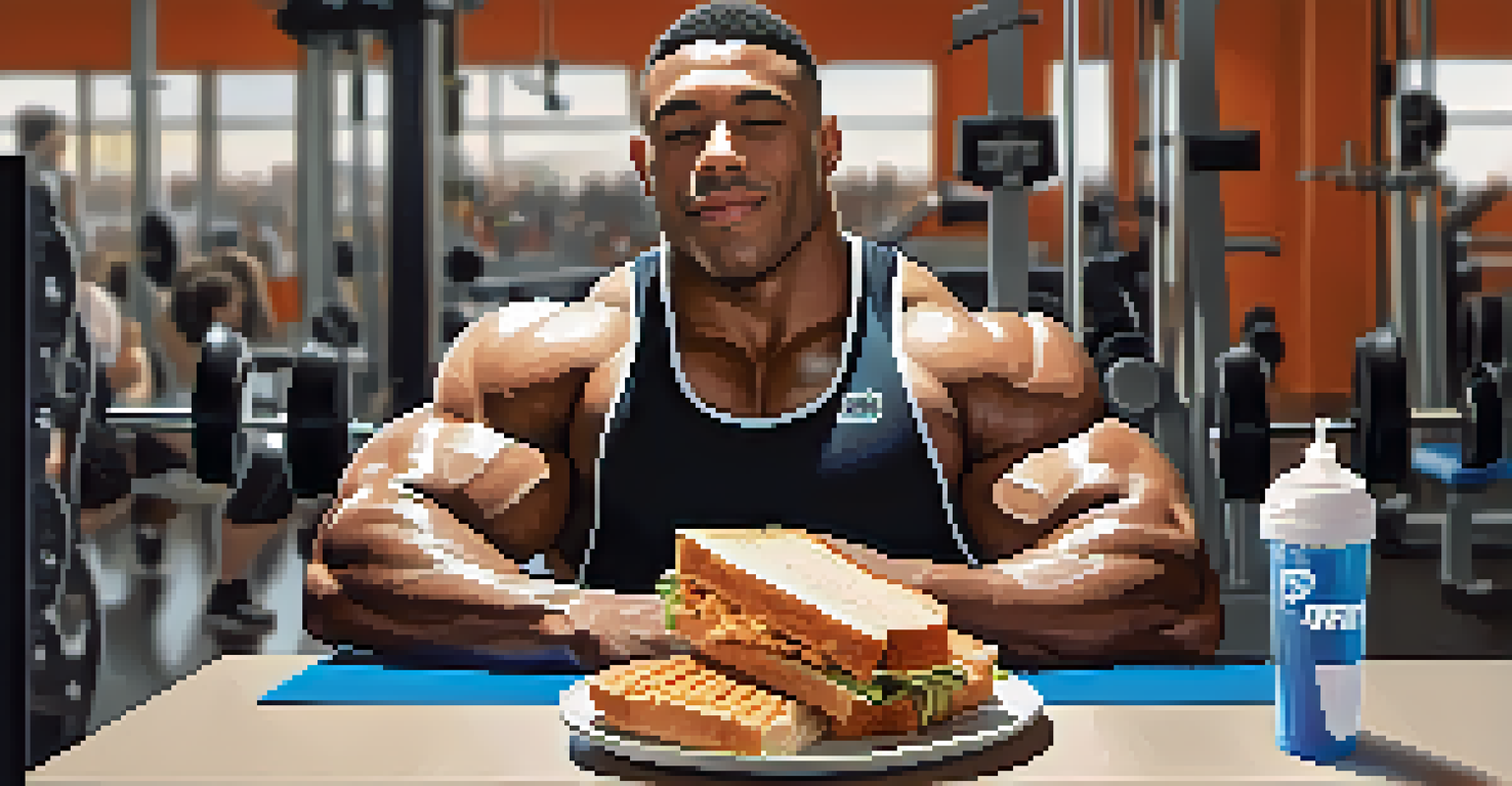Effective Nutrition Strategies for Powerlifting Competition Day

Understanding the Importance of Nutrition on Competition Day
Nutrition plays a crucial role in powerlifting, especially on competition day. It impacts not just your energy levels but also your overall performance. A well-planned diet can mean the difference between a personal record and a missed lift.
You are what you eat, so don't be fast, cheap, easy, or fake.
On competition day, your body needs the right fuel to perform at its best. This means focusing on foods that provide sustained energy and support muscle function. Understanding how nutrition affects your body will help you make informed choices as you prepare for your lifts.
Moreover, nutrition is about timing and not just what you eat. Consuming the right foods at the right times can enhance your performance, keeping you energized and focused. So, let’s dive into some effective strategies to optimize your nutrition for competition day.
Pre-Competition Meal: Timing and Composition
Your pre-competition meal sets the stage for your performance, so timing and composition are vital. Aim to eat this meal about three to four hours before your competition starts. This allows your body to digest the food without feeling heavy during your lifts.

Focus on a balanced meal that includes complex carbohydrates, lean protein, and healthy fats. For example, consider a bowl of oatmeal with a scoop of protein powder and a handful of nuts. This meal provides the energy you need while ensuring your muscles have the nutrients to perform optimally.
Nutrition Fuels Competition Success
A well-planned diet and proper timing are essential for optimizing energy and performance on competition day.
Avoid overly rich or greasy foods, as they can leave you feeling sluggish. Instead, opt for easily digestible options to keep your energy levels stable. Remember, the goal is to fuel your body effectively without any discomfort.
Hydration: The Unsung Hero of Performance
Hydration is often overlooked but is essential for peak performance in powerlifting. Dehydration can lead to muscle cramps, fatigue, and decreased strength, which are the last things you want on competition day. Start hydrating well in advance to ensure your body is primed for lifting.
Nutrition is not just about eating, it's about learning to live.
Aim to drink plenty of water throughout the days leading up to the competition. On the day itself, sip water regularly to maintain hydration levels but avoid overhydrating just before your lifts. Electrolyte drinks can also be beneficial, especially if you sweat a lot during your warm-up.
Listen to your body and adjust your fluid intake based on how you feel. A simple way to gauge your hydration status is by checking the color of your urine; pale yellow indicates good hydration. Staying hydrated will help you feel sharp and ready to tackle those weights.
Choosing the Right Snacks for Sustained Energy
Snacking wisely during the competition can help maintain your energy and focus. It’s crucial to choose snacks that are easy to digest and rich in carbohydrates. Think about options like bananas, energy bars, or rice cakes, which can provide quick energy without weighing you down.
Avoid snacks high in sugar or fat, as they can lead to energy crashes. Instead, aim for snacks that combine carbohydrates with a bit of protein for sustained energy. For example, a rice cake topped with peanut butter can keep you fueled between lifts.
Hydration is Key for Peak Performance
Staying adequately hydrated helps prevent fatigue and muscle cramps, ensuring you perform at your best.
Keep your snacks handy and eat them in moderation. You want to maintain energy levels without feeling overly full. The right snacks can keep your spirits high and your energy consistent throughout the day.
Post-Competition Nutrition: Recovery Matters
After a long day of lifting, your body craves recovery, and nutrition plays a pivotal role. Consuming a post-competition meal rich in protein and carbohydrates within 30 minutes can kickstart the recovery process. This meal helps repair muscle tissue and replenish glycogen stores that were depleted during competition.
Consider a protein shake paired with a banana or a chicken sandwich with whole-grain bread—both options are effective for recovery. Staying mindful of your post-competition nutrition can significantly impact how quickly you bounce back for future training sessions.
Don’t forget to hydrate again after the competition. Replenishing lost fluids is just as important as your post-lift meal. Proper recovery nutrition ensures you’re ready to tackle your next training cycle with enthusiasm.
Mindful Eating: Listening to Your Body
Mindful eating is about tuning into your body’s hunger and fullness cues, which can be particularly important on competition day. Stress and excitement can often mask your body’s signals, leading you to either overeat or undereat. Learning to listen to your body can help you make better food choices.
Take the time to savor each bite, especially during your pre-competition meal. This can help you recognize when you’re satisfied, preventing you from feeling bloated or uncomfortable as you prepare to lift. Remember, competition day is not just about the food—it’s about how you feel.
Post-Competition Recovery Matters
Consuming a balanced meal after lifting aids in recovery and prepares your body for future training sessions.
By practicing mindfulness, you can enhance your relationship with food and improve your overall performance. It’s a simple yet effective strategy that can lead to better choices and a more enjoyable competition experience.
Adjusting Nutrition Based on Individual Needs
Every athlete is unique, and nutrition should be tailored to individual needs and preferences. Factors such as body weight, metabolism, and personal tolerance to foods can all influence what works best for you. Experimenting with different foods during training can help you identify what fuels your performance optimally.
Consider keeping a food journal to track how certain meals and snacks affect your energy levels and performance. This can be a valuable tool for making adjustments as you prepare for competition day. Don’t hesitate to consult a sports nutritionist for personalized advice based on your specific goals and needs.

Remember, what works for one powerlifter may not work for another. Being flexible and open to adjustments will help you find your perfect nutrition strategy for competition day.